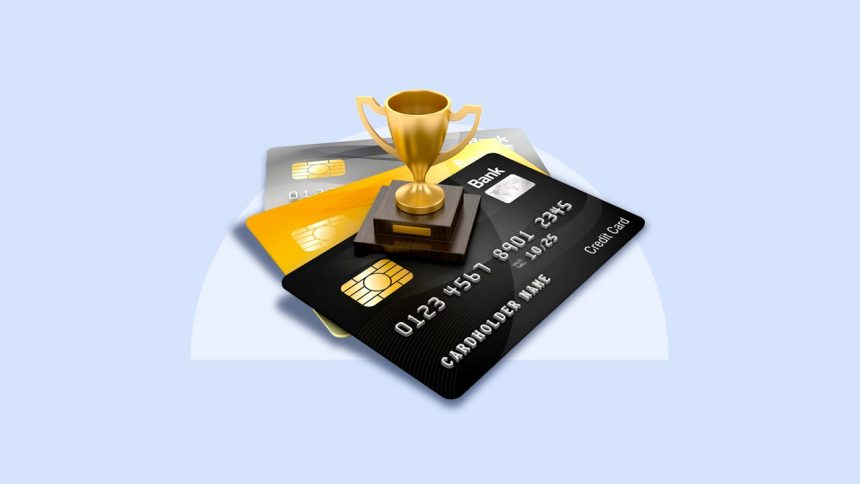porcorex/ Getty Images; Illustration by Austin Courregé/Bankrate
Rewards are one of the biggest perks of credit cards. They can fly you to a new destination, secure you a rental car or pay for your next grocery run. That could be why so many people continue chasing rewards even with debt hanging over their heads.
A new Bankrate survey shows that, among credit cardholders carrying a balance month to month, 72 percent are still making an effort to earn credit card rewards.
Credit card interest rates, inflation and other economic factors have made it harder for Americans to pay their bills. If you’re only paying for necessary expenses with your credit card — like groceries and gas — it makes sense to earn cash back or travel points on those purchases.
But if you’re focused on maximizing rewards to the point where you can’t afford the purchases, the interest charges on an unpaid balance will quickly outweigh those rewards.
“It doesn’t make sense to pay 20, 25 or 30 percent in interest just to earn a few percentage points in cash back or travel rewards,” says Ted Rossman, Bankrate senior industry analyst.
Rewards are great, but only if you’re able to pay in full and avoid interest each month.
— Ted Rossman, Bankrate Senior Industry Analyst
Bankrate’s key insights on chasing credit card rewards in debt
Key insights
- Seventy-six percent of Americans carry at least one credit card. Seventy-two percent of those cardholders who carry a balance month to month say they make at least some effort to earn credit card rewards.
- Young people and higher-income households are more likely to chase rewards. Eighty-nine percent of all Gen Z (ages 18-28) cardholders and 87 percent of all cardholders earning $100,000+ make an effort to earn credit card rewards.
- Fifty-four percent of credit card debtors say it’s gotten harder to pay off their credit card debt in the past year. That sentiment is especially true among boomers (ages 61-79) at 56 percent and Gen Xers (ages 45-60) at 66 percent.
4 in 5 cardholders try to earn rewards, but more than 2 in 5 cardholders are still in debt
Around 3 in 4 Americans (76 percent) have at least one credit card in their wallet, and there are good reasons for that.
Credit cards can help you build a good credit score, which can get you better terms for mortgages, auto loans, student loans and more.
Credit cards are also more convenient and secure than debit cards. Plus, you can often tap into cash back or travel rewards, which are essentially free money. In fact, 4 in 5 cardholders (80 percent) make at least some effort to earn rewards.
But the problem is that more than 7 in 10 credit cardholders (72 percent) who carry a balance from month to month are still pursuing rewards. That includes 46 percent who make “some effort” to earn credit card rewards and 26 percent who make “every effort.”
Notably, that’s more than the 67 percent of credit card debtors chasing rewards in 2024.
But overspending to keep up with the Joneses, indulge in a discretionary pastime or earn credit card rewards isn’t setting you up for long-term financial success.
If you’re only charging necessary expenses but still carrying a balance, chances are that one of the following — income, inflation or interest rates — is holding you back. Learning how to get out of debt with a low income is a good place to start. In the meantime, it’s a good idea to put your credit card away and use cash or a debit card if you can. That way, you can focus on paying down the debt you have without adding to it.
Younger generations and higher earners try harder to earn rewards
Whether you look to Gen Z’s love for Amex or rewards card ownership almost doubling from the lowest to highest income brackets, it’s easy to find people who love their credit card rewards.
Eighty-nine percent of Gen Z cardholders and 85 percent of millennial cardholders (ages 29-44) say they make some or every effort to earn rewards, compared to 78 percent of Gen Xers and 72 percent of boomers with credit cards.
Meanwhile, 87 percent of card-holding households earning $100,000+ make an effort to earn credit card rewards. That’s compared to 85 percent who earn between $80,000 and $99,999 annually, 80 percent who earn between $50,000 and $79,999 and 76 percent who earn less than $50,000 per year.
More than half of debtors say it’s gotten harder to pay off their credit card
With inflation still hovering at 3 percent and credit card interest rates not expected to drop much below 20 percent, credit card balances are easier to accrue and seemingly harder to pay off.
More than half of credit card debtors (54 percent) say it’s gotten harder to pay off their credit card debt over the past year. That includes 31 percent who say it’s gotten “much harder” and 23 percent say it’s gotten “a little harder.”
Only 18 percent of credit card debtors say it has gotten easier to pay off their debt over the past year. Twenty-nine percent say the difficulty level is about the same.
Older generations, who may have had more time to accrue debt or remember the years of lower interest rates, are more likely to say debt payoff has gotten harder. Two-thirds of Gen Xers (66 percent) and over half of boomers (56 percent) with credit card debt say it’s gotten harder to pay off their debt over the past year. That’s compared to fewer than half of millennials (46 percent) and just 39 percent of Gen Zers.
What to do if you have credit card debt instead of chasing rewards
Paying off credit card debt and earning rewards doesn’t have to be either/or in the grand scheme of things, but tackling debt should be your top priority. It’s not worth overspending to earn those extra points or cash back if you can’t pay off your balance at the end of the month.
- Make a debt repayment plan. Credit card debt can quickly get out of control as interest charges compound daily. “It’s important to pay [your debt] down as quickly and cost-effectively as possible,” Rossman says. “If you can’t pay it all right away, sign up for a 0 percent balance transfer card and avoid interest for up to 21 months.”
- Pay with cash or a debit card instead of a credit card. There are purchases almost everyone has to make, like food, gas and utility bills. It’s a good idea to avoid charging those purchases to your credit card for now if you’re already carrying a balance, because it only adds to your potential for interest charges and lengthens your repayment timeline. Instead, swipe your debit card or withdraw cash for those everyday expenses until your credit card balance is back down to $0.
- Consider credit counseling. Rossman also suggests working with a reputable nonprofit credit counseling agency such as Money Management International. “They can often negotiate something like a 6 or 7 percent interest rate over four or five years,” he explains. Learn more about working with a credit counselor.
Read the full article here
















